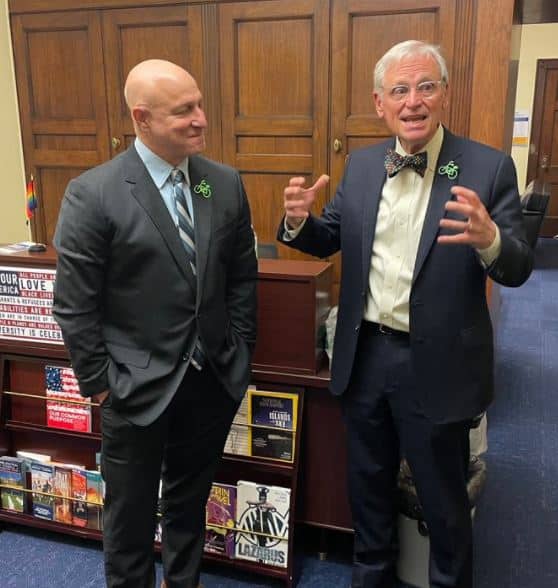House Passes $55 Billion COVID Relief Bill for Restaurants, Bars, Others

WASHINGTON — The House on Thursday approved a $55 billion COVID-19 relief bill aimed at helping restaurants, bars and other businesses shake off the lingering effects of the now two-year-old pandemic.
But even with the rush put on considering the bill in the House ahead of a two-week long spring recess, those who need the aid will still have to wait for the Senate to return from recess to learn if the legislation will make it to the president’s desk for his signature.
The House voted 223-203 on the measure, which sets aside $42 billion of the total for restaurants that applied for aid but never received it because the original $28.6 billion fund ran dry.
Reps. Earl Blumenauer, D-Ore., and Dean Phillips, D-Minn., who championed the measure, said nearly 300,000 restaurants and bars applied for the grants in 2021, but only about one-third received relief.
For many of those businesses, the fund running out was a death sentence.
“While we are moving out of the crisis phase of this pandemic, the devastating economic impacts will linger for years,” Blumenauer said after the vote. “Restaurants and their employees have been hit harder than any other industry during this crisis. They were the first forced to shut down by state and local government in March 2020, and they were the last allowed to reopen. Unemployment in the restaurant industry remains stubbornly slow to recover and approximately 90,000 restaurants have closed permanently since the start of the pandemic.
“Restaurants are the cornerstone of a livable community: They have employed nearly 60% of Americans at some point in their lives, they are a major source of employment for people of color, and they support a $1 trillion supply chain,” he continued. “It is not enough to address just the health-related concerns of this pandemic. We must support our beloved restaurants and protect the jobs, supply chains and local economies they support.
“The federal government has provided some help to these institutions through the Restaurant Revitalization Fund, a program based on my RESTAURANTS Act that I first introduced in June 2020. But the program has fallen short. Only one-third of all applicants were funded, leaving nearly 177,000 hanging in the balance.
“Today’s vote for my Relief for Restaurants and other Hard Hit Small Businesses Act finishes the job,” Blumenauer said. “This legislation is simple: It funds restaurants that did not receive awards, it helps other battered industries like live events, travel, hospitality and fitness, and it supports shuttered venues. And it will be paid for with fraudulent pandemic relief funds that are recovered.”
Though the House bill garnered some Republican support, a major sticking point was how the costs would be paid for.
Democrats argued the measure would not add to the deficit because it would be offset by funds recouped from fraudulent claims under the program after it was introduced last year.
But that wasn’t enough assurance for most of the Republicans in the chamber, and similar concerns prevented a vote on a similar measure in the Senate this week.
Senate Small Business Committee Chairman Benjamin Cardin, D-Md., had been working on a $48 billion proposal with Sen. Roger Wicker, R-Miss., and the two men reportedly hoped their proposal would be voted on this week.
The bills would obviously need to be reconciled to eliminate the $7 billion difference, but it would be advanced before the Senate.
The problem was the chamber was also considering a $10 billion COVID-19 relief package, and many of the same offsets Cardin and Wicker were relying on in their math got absorbed in the COVID-19 bill.
As a result Senate Majority Leader Chuck Schumer, D-N.Y., decided to temporarily put the Senate restaurant bill on ice, at least until after the recess.
In the meantime, Senate Republicans blocked consideration of the COVID-19 bill.
In a statement on its Twitter feed, the Independent Restaurant Coalition called the vote “a big win for our industry,” adding “now it’s up to the Senate to finish the job.”
Sean Kennedy, executive vice president for public affairs for the National Restaurant Association, said in a statement that “after nearly a year of advocating for RRF replenishment, the momentum of the last few days has been overwhelming for the restaurant industry.”
“Today’s vote shows that the House recognizes that restaurants are still in crisis and that the need for emergency funding still exists,” Kennedy said.
But not everyone was happy after the vote. In fact, the Committee for a Responsible Federal Budget noted the bill has not yet been scored by the Congressional Budget Office and appears to be mostly deficit-financed.
“The inflation rate is 8%, and Washington still can’t kick its addiction to deficit spending. Yesterday the president extended a regressive and costly student debt pause, and today the House votes to send another $55 billion to restaurants and businesses without many real offsets or so much as a CBO score,” said Maya MacGuineas, president of the Committee for a Responsible Federal Budget, in a written statement.
The government has already authorized over $6 trillion of COVID-19 relief. With inflation surging, “debt near record highs, and unemployment at pre-pandemic levels, now is not the time for more. Instead, we should be lowering deficits to help the Federal Reserve get inflation back under control,” she continued. “Any new spending should be focused on addressing the pandemic itself, and should be fully offset so as not to increase deficits or worsen inflation. It’s past time for the era of debt financing to come to an end.”
Dan can be reached at [email protected] and at https://twitter.com/DanMcCue
Correction: A prior version of this article included an inaccurate reference to the length of the current spring recess in the House and Senate. The recess is two weeks long, not three. We apologize for the mistake.
























